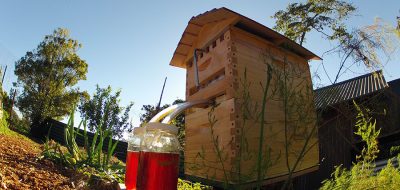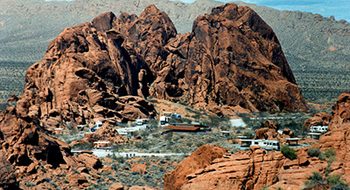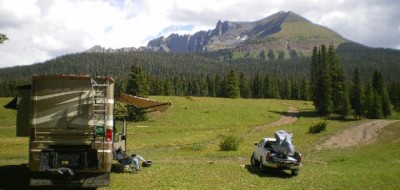By Bob Difley
 It’s hardly a stretch of the imagination to connect boondocking with a non-polluting, non-wasteful, natural resource saving–or green–lifestyle. This lifestyle, and the good habits it encourages, not only enables us to extend our boondocking time in the great outdoors but is also good for nature and the environment. About the only non-green activity associated with our green lifestyle is driving our rigs to our campsites, though the newer motorhomes and trucks coming on the market are making positive improvements in the mileage.
It’s hardly a stretch of the imagination to connect boondocking with a non-polluting, non-wasteful, natural resource saving–or green–lifestyle. This lifestyle, and the good habits it encourages, not only enables us to extend our boondocking time in the great outdoors but is also good for nature and the environment. About the only non-green activity associated with our green lifestyle is driving our rigs to our campsites, though the newer motorhomes and trucks coming on the market are making positive improvements in the mileage.
Manufacturers are taking steps to reduce their waste and use of natural resources, and use of sustainable materials in the manufacture of our motorhomes, trailers, and fivers, as well as building smaller motorhomes with smaller, more efficient engines.
Winnebago’s small diesel Navion and View Class C motorhomes were the first to produce mileage figures in the 15 to 19 mpg range and others have followed. And soon we will see small hybrid electric motorhomes. Freightliner developed the first hybrid-electric Class A chassis, which will also be followed by others as gas prices rise, the crisis intensifies in the oil producing countries, and hybrid and battery manufacturing costs come down. Chassis manufacturers are testing electric and diesel hybrid combinations for commercial busses and delivery van fleets. These too will eventually filter down to the RV market.
But given that our rigs, whether driving or towing, are not yet miserly in the use of fuel, we are still conservative in our total fuel used since we usually go to our destination location and stay for a few days without driving it. In the long run we will save fuel over someone who commutes to work everyday, even though a passenger car gets higher mileage, a daily commuter drives more total miles and in the end uses more fuel.
But what about the rest of RVing and the green lifestyle? When camping, we use fewer natural resources than when at home. The rig uses less heat to warm up the smaller interior, less water, less electricity for lights, uses a smaller screen TV, smaller microwave. Most all of our RV appliances are smaller than the heavy usage appliances and toys that we use in our frame houses.
We also tend to be more wasteful if we don’t have to be concerned with running out of water, or filling up our holding tanks, or our batteries going dead. Try following some of the habits the next time you go boondocking that you follow at home, like not turning off the water between soaping and rinsing in the shower, or turning on all the lights, radio, and TV and leaving them on even when no one is using them, and see how long before your RV systems prove inadequate.
When is the last time you had to cut down on water usage at home because your holding tanks were almost full? When you don’t have a sewer, you learn to use less very quickly.
Yes, boondocking—in fact all of RV camping—is far more environmentally friendly and much less wasteful than living in fixed housing with unlimited and too-easily obtained electricity, water, waste disposal, and trash pick-up. When boondocking we are, by the very nature of the lifestyle, forced to conserve and use less. And that’s something to feel good about.
Check out my website for more RVing tips and destinations and my ebooks, BOONDOCKING: Finding the Perfect Campsite on America’s Public Lands, Snowbird Guide to Boondocking in the Southwestern Deserts, and 111 Ways to Get the Biggest Bang out of your RV Lifestyle Dollar.





låna pengar trots skulder hos kronofogden
Great post. I am a regular visitor of your website and appreciate you taking the time to maintain the excellent site. I will be a frequent visitor for a long time.
colon cleansing
My considerable internet look up has now been honored with awesome information to exchange with my guests.
colon cleanser
Just stumbled upon your blog and wanted to say that i have really enjoyed reading your blog posts. any way i’ll be subscribing to your feed and i hope you post again soon.
sms lån 50000
Thank you for a very interesting blog. What else could I get that type of info written in such an ideal means? I have a challenge that I am just now operating on, and I’ve been at the look out for such information.
Pingback: Homepage
Cindy
The Germans have been making fuel efficient diesel RVs for years. Top of the line are the “Hymer” label, which even in the 25′ model get over 20 mpg. These “wohnmobil” however, are not made for full time living in many respects. They are 4 season, but the lack of space can be claustrophobic. They have 2.4L or 2.5L engines and bringing along a “toad” is not always practical due to weight issues. It does point out, however, that the USA is still behind, partly due to the some people’s criticism of diesel fuel. We could have been making small, more fuel efficient models for decades. We live in Europe 6 months each year and have a diesel mini- van – 40 mpg is normal for us. It can be done, it is being done.
Another interesting thing about European RVs and trailers is that some have underfloor heating, which is much more efficient generally. Finnish trailers have hot water radiant heat. American manufacturers need to look to the example of what’s being done elsewhere to gain inspiration.
Donna
Where was the picture taken on this article?? Looks lovely 🙂
GaryM
Hi Bob – you are right on the money. We do waste more when we are home. We have been putzing around Montana and as soon as we hit a camp with hookups or home, our resource saving habits go right out the window. We shut down the computers, tvs, radios, lights – nearly everything when we are boondocking. At home, we run to the store and leave the lights on, the tv going and we don’t want to be cold when we get back so we never turn the heat down. All the noise and lights make the old cat feel more comfy, I am sure…
We are plotting our next putz – probably out at the lake or on the Missouri. Can’t go far with the big Ford Diesel and the price of fuel. Wish we would have taken care earlier in our lives. We will do the best possible as we go along. Thanks for all your good info.
Gary